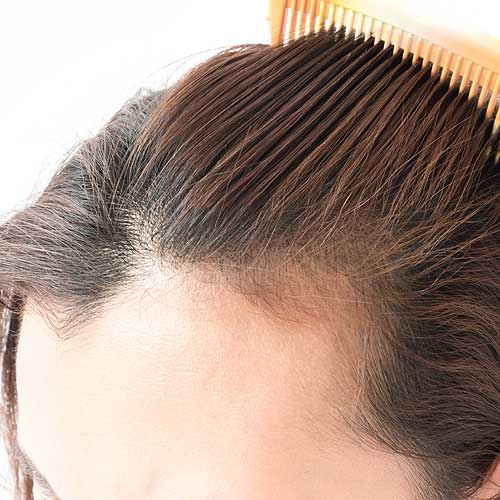Understanding Alopecia Areata
 Alopecia areata is a common autoimmune disorder that affects millions of people worldwide. This condition causes hair loss in various body areas and can deeply impact a person’s self-esteem and quality of life. In this comprehensive guide, we will explore the causes, symptoms, and treatments for alopecia areata, focusing on men’s hair loss, non-surgical hair replacement, and hair loss treatments.
Alopecia areata is a common autoimmune disorder that affects millions of people worldwide. This condition causes hair loss in various body areas and can deeply impact a person’s self-esteem and quality of life. In this comprehensive guide, we will explore the causes, symptoms, and treatments for alopecia areata, focusing on men’s hair loss, non-surgical hair replacement, and hair loss treatments.
Alopecia areata is an autoimmune disease where the body’s immune system mistakenly attacks its own hair follicles, leading to hair loss. The term “alopecia” means baldness, while “areata” refers to the patchy nature of the hair loss. This condition can affect people of all ages, genders, and ethnicities but is most common during childhood or teenage years.
Approximately 2% of the global population will experience alopecia areata at some point in their lives, which translates to nearly 6.7 million people in the United States and 160 million worldwide. Current estimates suggest that around 700,000 people in the U.S. have some form of alopecia areata.
Causes of Alopecia Areata
The exact cause of alopecia areata remains unknown, but it is primarily attributed to the immune system’s malfunction. In this case, the immune system erroneously targets hair follicles, causing inflammation and hair loss. Genetic factors may contribute to this abnormal immune response, but environmental factors and stress may also play a role.
Although not every child with a family history of alopecia areata will develop the condition, having a close blood relative with the disorder increases the risk. Further research is needed to identify specific genes associated with alopecia areata and better understand the genetic component.
Environmental factors, such as exposure to toxins, allergens, or infections, may trigger the onset of alopecia areata in genetically predisposed individuals. However, the exact relationship between environmental factors and the development of alopecia areata remains unclear.
Psychological stress has long been suspected as a possible trigger for alopecia areata, but the connection is still not fully understood. Some studies suggest that stress may contribute to the onset or exacerbation of the condition, while others have found no association between stress levels and alopecia areata.
Symptoms of Alopecia Areata
The primary symptom of alopecia areata is hair loss, which can occur on the scalp, face, and other body areas such as underarms or legs. Hair loss typically appears in small, circular patches, leaving coin-sized areas of bare skin.
A dermatologist typically diagnoses alopecia areata based on the characteristic pattern of hair loss and a thorough examination of the affected areas. In some cases, they may perform a skin biopsy or blood tests to rule out other potential causes of hair loss.
Related: How Does Non-Surgical Hair Replacement for Men work?
Several other conditions can cause hair loss, making it essential to accurately diagnose alopecia areata. These include:
- Androgenetic alopecia (male or female pattern baldness)
- Telogen effluvium (temporary hair loss due to stress, illness, or medication)
- Tinea capitis (fungal infection of the scalp)
- Trichotillomania (hair-pulling disorder)
Treatment Options for Alopecia Areata
There is no cure for alopecia areata, but various treatments can help manage the condition and promote hair regrowth. The choice of therapy depends on the severity of hair loss, the individual’s age, and their overall health. One should always consult with their primary care provider and dermatologist for proper diagnosis and treatment.
Non-Surgical Hair Replacement
For individuals seeking immediate cosmetic improvement, non-surgical hair replacement options, such as wigs or hairpieces, can provide a natural-looking and comfortable solution. Custom-made wigs or hairpieces can be designed to match the individual’s hair color, texture, and style, allowing for a seamless and discreet appearance.
Coping with Alopecia Areata
Living with alopecia areata can be emotionally challenging, as hair loss can significantly impact a person’s self-esteem and overall well-being. Seeking support from friends, family, or support groups can be beneficial in coping with the emotional aspects of the condition. Additionally, working with a mental health professional, such as a psychologist or counselor, may help address issues related to depression, anxiety, or self-image.
Ongoing Research and Future Developments
Researchers continue to study alopecia areata, aiming to better understand the underlying causes and develop more effective treatments. Dermatologists are at the forefront of this research, and adults with widespread alopecia areata may be eligible to participate in clinical trials evaluating new treatment options. By understanding the causes, symptoms, and available treatment options, individuals affected by alopecia areata can take an active role in managing their condition and improving their overall well-being.
